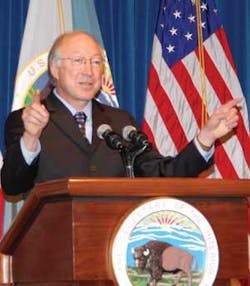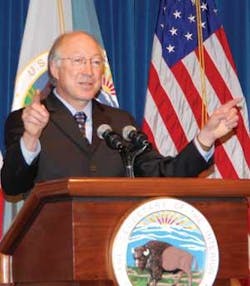Salazar launches MMS ethics reform program
US Interior Secretary Ken Salazar launched an ethics reform program Jan. 29 to examine conduct of a group of US Minerals Management Service employees, look at restructuring the agency’s oil and gas royalty program, and review DOI’s ethics regulations and policies.
“Our agenda for reform will reach every part of this department. But it will also send a loud and clear signal to the special interests outside of this department who have become accustomed to the ‘anything goes’ attitude in Washington over the last 8 years,” Salazar told MMS employees in Lakewood, Colo.
“The ‘anything goes’ will end. And this department, and the Minerals Management Service, will lead the way in ending it,” he declared. Salazar said he announced the program to MMS Denver-area employees “because the ethical lapses in this office, and the individuals who engaged in blatant and criminal conflicts of interest and self-dealing, set one of the worst examples of corruption and abuse in government.”
He said the effort will be led by Tom Strickland, his chief of staff, who was US Attorney for Colorado when Salazar was the state’s attorney general.
Salazar ordered a re-examination of potential criminal conduct by persons named in DOI Inspector General Earl E. Devaney’s three reports. The documents described misconduct ranging from blatant conflicts of interest to drug abuse and sexual activity by employees of MMS’s royalty management program. They also charged that supervisors disregarded other employees’ attempts to bring the violations to the appropriate authorities’ attention.
‘Appropriate sanction’
“I have asked the [US] Department of Justice and, if appropriate, the Colorado US Attorney’s office to review whether the criminal determinations made earlier were correct. Given the seriousness of the findings of the [Office of Inspector General], I want to make sure that those who blatantly flaunted the law receive the appropriate sanction,” the secretary said.
He also ordered Strickland to review personnel actions taken against individuals who were involved to determine whether sanctions were appropriate or if additional action is needed. Strickland also will lead reviews of reports by Devaney, the US Government Accountability Office, and a joint commission led by former US Sens. Robert Kerrey (D-Neb.) and Jake Garn (R-Utah) to determine if their recommendations are being implemented.
“We want to ensure that the actions taken to date are comprehensive. If they are not, we will take additional steps,” Salazar said.
He also ordered publication of a new code of conduct for MMS employees. “This was designed specifically to address some of the problems identified by the inspector general. To the extent there was any confusion about applicable government ethics standards or guidance, the code of conduct clarifies the ethics standards to which all employees are bound. There will be no exceptions,” he said.
In a separate letter to MMS employees, Acting Director Walter D. Cruickshank asked them to keep ethics at the forefront of everything they do as they work in a conscientious and professional manner. He encouraged them to report it if they see anything wrong, and to contact the DOI agency’s ethics office if they have any questions.
Gifts are prohibited
The code specifically states that MMS employees are prohibited from soliciting or accepting gifts or other items of monetary value from any prohibited source or that are given because of the employee’s official position.
“A prohibited source includes any person or entity that is seeking official action by MMS, does business or seeks to do business with MMS, conducts activities regulated by MMS, has interests that may be substantially affected by the performance or nonperformance of the employee, or is an organization the majority of whose members” fit these descriptions, it says.
The prohibition applies to any gift, regardless of its value or nature, the code emphasizes. It includes gratuities, favors, discounts, entertainment, hospitality, loan, forbearance or any other item having monetary value. It also includes services as well as gifts of training, transportation, local travel, lodging and meals, “whether provided in-kind, by purchase of a ticket, payment in advance, or reimbursement after expenses have been incurred.” Receipt of a gift is not made acceptable by comparable reciprocation such as that which might occur at a social event, the code says.
“In addition, even if a regulatory exclusion or exception may apply, it is never inappropriate and frequently prudent for an employee to decline a gift offered by a prohibited source or because of his official position,” it adds.
The code also states that MMS employees will act impartially and not give preferential treatment to any private organization or individual. “If an employee’s actions become the subject of scrutiny, they will be viewed after-the-fact with the benefit of hindsight. Therefore, an employee should consider how others might view their actions. Employees must always strive to maintain transparency of operations,” it says.
It says that MMS employees also will not use federal property for unauthorized purposes. “Limited personal use of certain office equipment is authorized as long as it occurs on nonduty time, does not interfere with official business, is not a commercial gain activity or otherwise prohibited (e.g., gambling or the viewing of sexually explicit material), is of negligible expense, and is in compliance with applicable policy,” it says.
Outside employment
Employees also are barred from holding or seeking outside jobs which conflict with their official duties and responsibilities. They must obtain prior written approval to engage in activities, whether for compensation or not, that is related to their official duties with MMS, or is related to DOI’s mission, or is performed for a prohibited source.
“An MMS employee seeking outside employment is responsible for ensuring that no real or apparent conflict of interest exists and that a reasonable person with knowledge of the relevant facts would have no cause to question the integrity of the bureau’s programs,” the code of conduct says.
MMS employees also are expected to disclose waste, fraud, abuse, and corruption to appropriate employees, it continues. Notifications may be anonymous but should contain as much specific information as possible to allow the matter to be adequately investigated. MMS is committed to complying with the Whistleblower Protection Act, which safeguards the rights of anyone coming forward in this manner, it says.
Employees also will avoid creating the appearance that they are violating the law or ethical standards, the code indicates. “Often, even the appearance of impropriety is as significant and damaging to the reputation of the employee and to the MMS as an actual infraction. Employees must be mindful of their responsibility to ensure that their high level of ethical standards is clearly evident to the American people,” it says.
Salazar told the MMS employees in Colorado that in a memorandum to all DOI personnel, the department would thoroughly review its own ethics policies and guidelines. He said that this review would build on US President Barack H. Obama’s order to the Office of Government Ethics to develop rules and regulations consistent with the ethics pledge for all Executive Branch employees.
“I have met with and direct the designated agency ethics official to review our departmental specific regulations and recommend areas where we can improve on our own ethical policies and guidance,” the secretary said.
“Finally, the problems that occurred here in Lakewood were the product of a few individuals and a set of special interests who capitalized on an outdated and flawed royalty collection system. So in addition to reviewing the cases of these individuals, we will examine a fundamental restructuring of MMS’s royalty program so that taxpayers can get their fair share from the development of natural resources, like oil and natural gas, on our public lands. Last year, this office alone collected $23 billion on behalf of the American taxpayer. All ideas for reform will be on the table,” he said.

